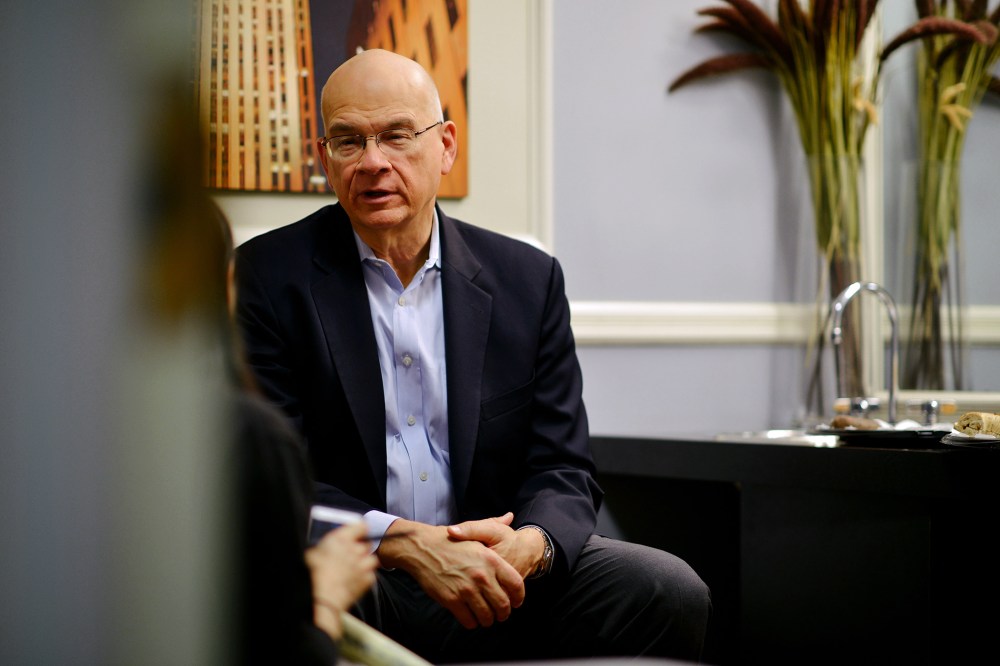Rev. Tim Keller is no stranger to suffering. He shepherded Redeemer Presbyterian Church during the 9/11 tragedy as more and more congregants turned closer to their faith. Since then, the church ballooned to a flock of 5,000 and is tackling pains of the modern age with traditional ideas from the Bible. On a more personal level, the senior pastor also lost both of his parents this year. His father passed away in February, his mother just this week. After his discussion today on the show, I sat down with Rev. Keller, who serves as my pastor, to talk about his recent losses, his job, and his latest book, Walking with God through Pain and Suffering.
Rev. Tim Keller: The suffering book is dedicated to my sister. The caregivers of the sufferers are sufferers. Nobody knows basically. Very often, they kind of get missed.
Laura Kim: What is the one big takeaway from your own book that you can apply to your own life right now during this period – or for your sister?
TK: The main thing is that suffering makes you stronger or worse, stronger or weaker. It’s not the suffering itself. It’s how your process it. People tend to say, suffering did this to me or suffering did that to me. But actually – for example, most people, who say they lost faith in God, say, “It’s because of suffering.” But most people who say that they found faith in God almost always say, “It’s because of suffering.” So, it can’t be the suffering so much. Suffering doesn’t automatically do anything to you. It’s how you understand it and process it. And therefore, to a great degree, it’s up to you what happens.
And I think that means, instead of feeling completely passive in front of suffering, saying, “Well, this is kind of happening to me.” Actually, you’re not. You’ve got quite a lot you can do. You talk to yourself about it. How you understand it. How you process it makes all the difference on whether it makes you a humbler person or a more self-absorbed person. For example, suffering can make you more self-absorbed than you’ve ever been because you say, “Oh, nobody suffered like me.” You feel noble. You feel better than other people. … You start to despise other people who have easier lives, and you don’t understand.
So, you get more self-absorbed or humbler. You can get more isolated from people or closer to other people. You can get compassionate and understand what people are going through, or else, more cynical… It’s all up to you. I mean, that’s to me actually the main takeaway. You have a lot of control. And you tend to feel passive when suffering hits you. You feel like, “I can’t do anything.” It’s just overwhelming you.
LK: So, what’s the inherent problem in asking, “Why me?” Because that’s the first question that people often ask.
TK: Well, there’s nothing wrong with that. No, of course not…
But, the “Why me?” doesn’t, in any way, tell you the suffering upon you, and how you respond to it won’t determine whether you become a stronger or weaker person. Or whether you become a self-absorbed person. Or a more compassionate person. Answering the question, “Why?” doesn’t help a bit. So, it’s part of the process, I think.
And I think, some people, because they don’t get an answer, just decide…”I’m just not going to respond in kindness. I’m not going to respond with patience. I’m not going to try to help other people.” In other words, some people feel, “Because I don’t get an answer to that question, I can really just melt down.” Other people say, “I don’t have an answer to this question, but I’ve got things I’ve got to do.”
But, you’re not going to get an answer to that question. The specific answer to the question.
Now, the general answer is in the Bible, if you’re a Christian. The general answer is: God loves you. He’s got purposes you don’t know. He came to the cross and died, and therefore, experiences suffering. Therefore, he does care about you and understand. In Resurrection, He’s going to put everything right. Those are broad answers. You’re looking for specific answers. Why did this bad thing happen to me right here? And the answer is – you don’t get that answer.
LK: In your book, you talk about addressing suffering head on. Do you find that our culture is a culture of avoidance?











